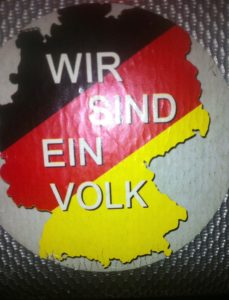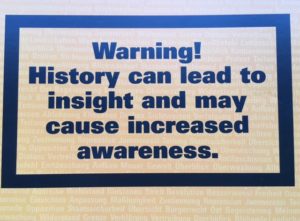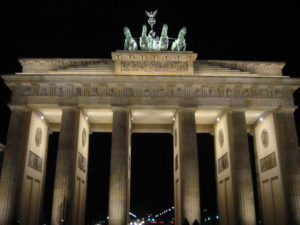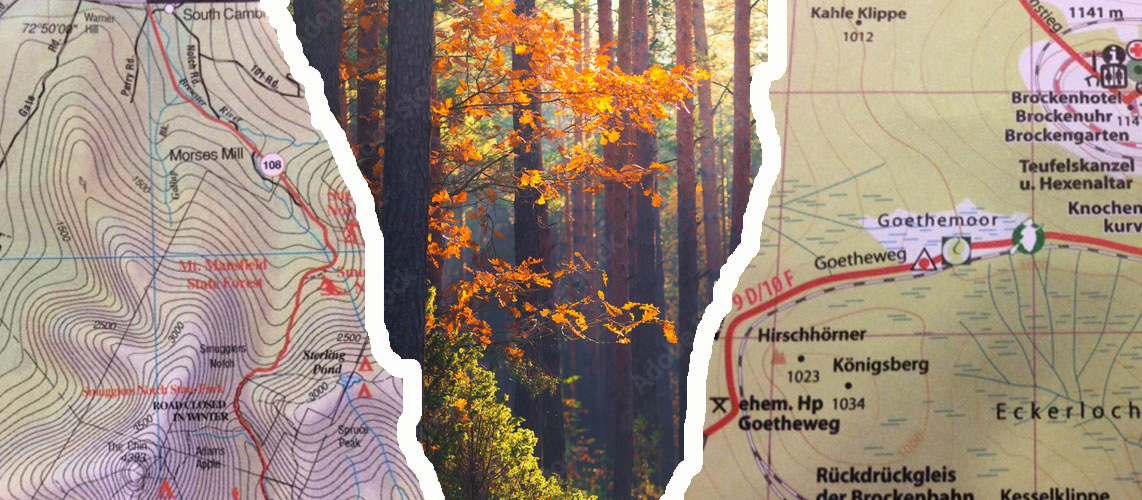
I took this photo three years ago, on a sunny August day in 2014. The moment is etched in my memory: I was on a ferry, crossing to one of the islands in the North Sea for a mini vacation, when I noticed this sticker on a fellow traveler’s suitcase. I had never owned or raised a German flag – for reasons I don’t need to explain, Germans tend to display their national flag more sparingly than citizens of other countries.
But something about this sticker with the shape of the reunited Germany and the words “We are One People” touched me in a way that brought tears to my eyes and a huge smile to my face at the same time. Maybe it was the refreshing gusts of North Sea air, combined with gratitude for my explorations in eastern Germany and a certain lightness of being that I had detected in my fellow Germans in recent years. Certainly it was the memories of November 1989, when courageous people all over East Germany decided to protest against their repressive government with the slogan “We are the people,” which soon after the fall of the Berlin Wall, turned to chants of “We are one people”.
“We” officially became one people on October 3, 1990. Much has happened since then, and “we” often seem like an unruly, squabbling lot. For some people, the euphoria of the “Wende” (the “turnaround”, as the fall of the Berlin Wall and end of the GDR regime are referred to in German) turned to frustration: For many East Germans, frustration about high unemployment, unequal pay, and unethical behavior of, for example, real estate and industrial investment sharks – not to mention the challenges of adapting to a profoundly different way of being. For West Germans, frustration about what they perceived as whining from Ossis (East Germans), who they thought should be grateful for all the help they were getting from the West. You can read/hear more on the “culture shock” aspects of reunification in a radio commentary I wrote on the 25th Day of German Unity in 2015.
Worse than frustration, in many places there were violent attacks against foreigners, or people who somehow looked foreign. My heart sank when, three months after my moment of bliss on the North Sea, I heard the slogan “We are the people” used by protesters calling themselves the “Patriotic Europeans Against the Islamization of the West” (Pegida).
 Perhaps I was lucky to live far from Germany for most of the time since the Wende, because despite such problematic news, the distance allowed me to maintain a background sense of joy and gratitude for the events of 1989. Or naïve euphoria, you might think. What I can say for sure is that those events led to my realization that history is not just the past, but that we can ask questions about the past and see what we might learn from it. This is one of the goals of my “border project” – to look at the developments of the last 27 years. Are the xenophobic attacks a particularly East German phenomenon, and if so, why? What, or how much, does all of this have to do with the outcome of the recent election, in which the Alternative for Germany (AfD, a political party that espouses many of Pegida’s views) gained entry into the German parliament with 13+%? What does it mean to be German, or any other nationality, in this time of globalization and migration?
Perhaps I was lucky to live far from Germany for most of the time since the Wende, because despite such problematic news, the distance allowed me to maintain a background sense of joy and gratitude for the events of 1989. Or naïve euphoria, you might think. What I can say for sure is that those events led to my realization that history is not just the past, but that we can ask questions about the past and see what we might learn from it. This is one of the goals of my “border project” – to look at the developments of the last 27 years. Are the xenophobic attacks a particularly East German phenomenon, and if so, why? What, or how much, does all of this have to do with the outcome of the recent election, in which the Alternative for Germany (AfD, a political party that espouses many of Pegida’s views) gained entry into the German parliament with 13+%? What does it mean to be German, or any other nationality, in this time of globalization and migration?
I know, you want quick and reliable conclusions about all of this, but then who would read my book?! More seriously, my exploration is as much an anthropological endeavor as it is a journalistic one – and in any case, isn’t the best journalism rooted in anthropological work anyway? Even in this world of fast media, finding out what people think and feel takes time.
 So today, I invite you to celebrate the undeniable good news of 1989 and 1990 with me. Most importantly, that the people of East Germany pulled off a Peaceful Revolution. You already know that for me personally, reunification has meant a great gift and I suspect that despite all the challenges and setbacks, this is true of many, many other people in this country. Besides, did anyone really believe that joining two such fundamentally different societies would be easy?
So today, I invite you to celebrate the undeniable good news of 1989 and 1990 with me. Most importantly, that the people of East Germany pulled off a Peaceful Revolution. You already know that for me personally, reunification has meant a great gift and I suspect that despite all the challenges and setbacks, this is true of many, many other people in this country. Besides, did anyone really believe that joining two such fundamentally different societies would be easy?

Kerstin, from my point of view you summarized the events of 1989/90 and the development until today very well in a very short and sensible comment. Although I am one generation ahead I had and I’m having similar observations like you. Thank you,
Heiner Wischhusen, Bremen, Germany
Hallo Heiner,
great; I am so glad to hear that!
Kerstin
This is a great post. I’m can see your project taking shape and the questions you’ve outlined to explore are really good ones. Timely with an appreciation for the context of what has been. Excited to learn through your experience and reporting.
Danke Emilie!
[…] did the 40-year division of the country leave in people’s lives and in society? Here is my post from October 3, 2017, which still rings true. All in all, I would still err on the side of celebration, even if unity is […]